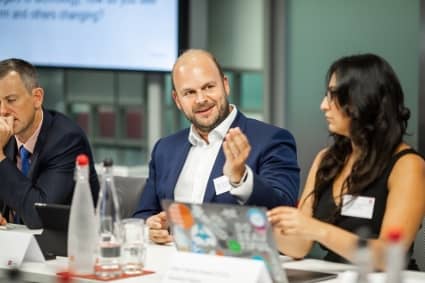Why ‘dark’ fallout and job loss warning on Artificial Intelligence is wrong
Updated 7th July 2022 | 3 min read Published 29th August 2018

It made my heart sink when I read the Bank of England’s chief economist, Andy Haldane, almost scaremongering readers with his Artificial Intelligence predictions (The Times, 21st August).
Of course, AI will have an impact across every industry, but it seems rather short-sighted to think machines will entirely replace humans doing thinking things.
Technology has been a serious part of our world for 20 years. I look back and remember the strange sound of a dial-up connection - the noise of being part of the beginning of the Internet. There are no more memorandums to sign as they are passed around the office. No more fax machines beeping in the background. As the technology evolution has progressed, have we all lost our jobs? I don’t think so. We’ve been able to use tech to automate parts of our home and business lives which in turn has enabled us to add humour, empathy, sympathy and most importantly, critical thinking to the task in hand.
AI is enabling processes to be simplified across several industries. The first evidence comes from HMRC’s launch of ‘Open HMRC’, using Alexa (AI technology) to remind taxpayers to renew their tax credits. Just last week, the NHS adopted AI across hospitals to address coronary heart disease amongst other applications to medical professionals to speed up diagnosis. AI will also assist in robotic surgery, virtual nursing, administrative tasks and image analysis.
In our industry, AI is empowering accountancy professionals to make decisions quicker as it’s removing very time-consuming processes and enabling us to expand not only the depth but the range of services offered to clients. At IRIS, we are looking at AI as a way of simplifying tasks. With legislative changes such as Making Tax Digital on the horizon we are identifying new ways to make our environment frictionless, so SMEs, accountancy practices and HMRC all benefit.
We are also seeing specialists like MindBridge using AI to assess risk in the review of financial records; previously, only a manual sample could be extracted to detect and analyse financial anomalies. AI technology now enables professionals to gain far greater insight without replacing any human intelligence. In fact, these tools enable accountants to apply critical thinking (which AI cannot) to provide detailed insights and add value to their client relationships.
For Haldane to say that “the rise of artificial intelligence will have a ‘dark’ fallout, even more disruptive than previous industrial revolutions”, seems to be a sweeping statement which – ironically – is just not true in the financial services industry.
We are amid a once-in-a-generation, political, legislative, economic and social disruption in the UK accountancy sector. The cost of compliance is going up; the amount of regulatory change is increasing, and accountants are being asked to do more for less. We are also struggling with key skills and the talent gap: according to the FRC’s Key facts and trends annual report, there has only been a 1% growth in practice talent in the last ten years.
So how do we cope with and embrace these changes? I see the use of AI technology, not as a stick to beat humans out of jobs but another valuable tool to support us as we navigate the industry transformation. We need it to help automate tasks and allow accountancy professionals to be assured that core compliance is right first time. This helps practices evolve beyond traditional assurance services to capitalise on new business opportunities through better engagement and collaboration that attracts, manages and serve prospects, clients and staff.
Many industries are evolving, and technology enables us to thrive in these digital economies. It’s time to leave the pessimistic views behind and look at the opportunities AI brings.





